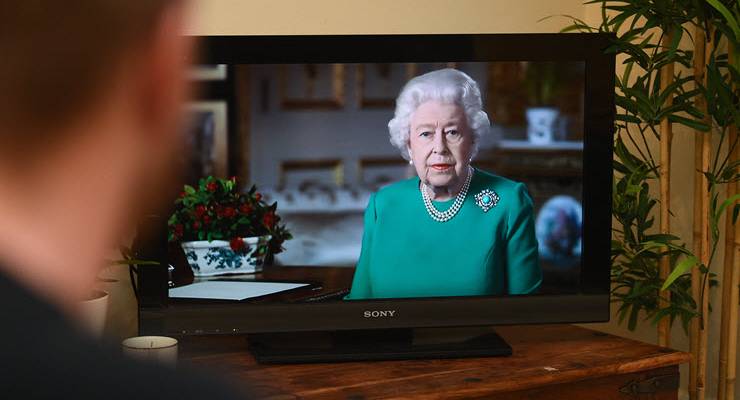
The word “service” is too often maligned. Bad service. Expensive service. A cheap, quick service. Dodgy service. Second-rate service.
Increasingly it’s been used to describe shoddy or substandard work complaints aimed at everyone and anyone — from hairdressers to lawyers, restaurants to insurance companies and airlines.
But this week, as word bubbles filled with the attributes of Queen Elizabeth II floated across media headlines and presidential tributes, “service” sat atop all others: grace, dignity, poise and serenity.
It was the queen’s steady service over her 70-year reign that stood out, gathering accolades and acclamation on talkback in central Queensland and on the world stage in Washington. Perhaps it was former Australian prime minister Paul Keating who said it best:
With her passing, her example of public service remains with us as a lesson in dedication to a lifelong mission in what she saw as the value of what is both enduringly good and right.
Keating has always had a way with words, good and bad. But his tribute cut to the heart of why this leader of more than a dozen Commonwealth realms also won the support of so many who have actively campaigned for Australia to become a republic.
“She was an exemplar of public leadership, married for a lifetime to political restraint, remaining always, the constitutional monarch,” Keating said. For a lifetime, she “instinctively attached herself to the public good against what she recognised as a tidal wave of private interest and private reward”.
That service remained steady through decades as her family became the subject of ridicule and court cases, and her biggest support — Prince Philip, Duke of Edinburgh — died. It’s a lesson we could all learn, particularly in how we see our own public service, those servants of the people whose job it is to be the innovators and implementers of good policy.
Only a couple of decades ago, both at a Commonwealth and state level, our public service was seen as a goal for clever young graduates and strategic wise heads.
Stories of directors-general arguing against the woeful policy to ministers would pop up repeatedly. So would proactive policy, developed inside our public service, that grew cities and plans and a future. Parents would encourage their children to “aim” for the public service, a job requiring dedication and hard work, but which would deliver stability, good conditions and a strong future.
Its people were at the heart of that narrative. Independent. Not lured by the big bucks that contractors with tiny footholds in government offered. Career trajectories that were safe, despite a merry-go-round of different governments.
What we’ve seen over the past decade is a constant chipping away at that. Clever young graduates being stolen by those companies now earning squillions through government contracts. A roundabout of public service leaders as new governments put their own “man” (because it usually is a man) in the job. A diminution in independence, which has now been raised by royal commissions or reviews or inquiries in almost every state — and another strong reason why we need a Commonwealth integrity body, with the speed of yesterday.
Ironically, the Albanese government policy promise of a national anti-corruption commission (and the parliamentary discussions around it) will be delayed by the queen’s death and the period of mourning.
But perhaps the best nod to Queen Elizabeth II would be a rethink of how we see public “service”. Bigger pay packets to compete with private enterprise. Non-political leaders who will stare down a minister, without fear or favour, because it’s the right thing to do. Career trajectories for school-leavers and graduates who are boarding planes to head up organisations and companies and start-ups across the globe. A service that puts the taxpayer at its centre and rewards those who deliver it.
That would be a service to us all.








As an ex commonwealth public servant i could not agree more. This fits with a major Monthly essay by Laura Tingle a year or so back. i believe it to be a deliberate strategy to reduce the skills and responsiveness of Government, thereby reducing the faith of Australians in Government, long term leading to acceptance of a reduced service role for Government. A conscious strategy by Abbott and Morrison and John Howard. Australia is the poorer. It will take many years of conscious reform by this and future governments to reverse the damage.
There has been a constant campaign of vilification of public servants as useless time-wasters. Then people complain about bureaucratic hold-ups, not having queries answered, slack regulation etc.
Imported US ideology, strategy and tactics; not even original but has been taken in and adopted hook, line and sinker.
Sadly, Keating committed one of the most abominable acts of neo liberalism in OZ by destroying the Department of Administrative Services, DAS. This department was the repository of knowledge and skills within the federal government, and its removal took any the skills base and left the door open to innumerable private contractors who have since ripped off the government unceasingly, and unproductively.
According to onion-eating conservatives that would be “suppository of knowledge and skills”. It makes more cents, in a neo-liberal environment.
Absolutely agree Madonna. No public services, utilities, should be privatised. Also education, hospitals will continue to slide in global competitiveness without strong state ownership.
Australia privatised the churches to take on the stolen generation and the migrant generation after that.
The child abuse that occurred under that privatisation was abhorrent. It carried shock waves into the community as something acceptable. Seen, abused and not heard.
Uncle Jack Charles died on the 12/9/22, my grandfather died the same day 12/9/74. I turned 21, 13/9/74. I’m honoured 2 great men died the day before my birthday so I can remember them and their amazing worth.
Uncle Jack was the other half to Bob MAza. Another amazing man whom I met in 1991. He came to Gosford Tafe to present the indigenous content of Australian society.
Wow – what an experience. Those two men were really something to experience. Makes me proud to be human.
Cheers
My Grandparents were English born – I’m 2nd generation Australian.
I’m caught inbetween two worlds where my roots are shallow. I know neither but kind of know both.
I’m thoughtful of both passing, and see the significance for both countries and beyond and all perceptions possible equally.
I think the wrecking of an independent public service started much earlier than a decade ago although we are certainly reaping the results more and more nowadays. PM Fraser in the 1970s swung the wrecking ball into action with his labelling public servants as “FatCats” and setting up “Razor Gangs” to “trim the fat”. Ongoing attacks have been effective in getting rid of those so called ‘fat cats’ working quietly and diligently for the benefit of the Commonwealth. No doubt enjoying some cream for their efforts along the way. Ironic to be replaced by hoards of fifo consultants, advisors, party hacks, etc etc jockeying for their turn to get their snouts ever deeper into the taxpayer trough.
Even if those in power wanted to it would likely take another generation to rebuild an independent, conscientious and loyal Public Service.
But re-build we must! Prioritize we must! Just as politicians require constant scrutiny; so too public servants need excel in the knowledge their accountability, expertise and loyalty are the means that secure democracy.
Rebuilding an independent, conscientious Public Service can only be done over the screaming, frothing, bloodied and twisting bodies of the IPA.
Sounds good to me – I’d be happy to do anything that would increase their discomfiture.
Independent, conscientious public service? Where? When?
You can’t “rebuild” something that has never existed in reality. It needs to be built, not rebuilt, and hopefully after a thorough customer centric and services provided review along with a thorough structure and staff review.
Independence? The sole reason for the Public Service to exist is to implement and administer Government policies on the ground. Any suggestion of independence is hilarious.
As to “conscientious”, that will require a completely different culture, from that which currently exists, as well as implementation of actual accountability and performance standards that are 100% customer centric.
When it comes to the Commonwealth, Howard explicitly changed the Public Service Act in 1999 to make ‘The Minister’ the #1 “customer” of each department (it had previously been the Secretary). Everything else fell into place, including the removal of ‘frank and fearless‘ from the its advice, and the APS was knackered.
UK ditto due to following, like Australian LNP, gutting, throttling and wrecking public service delivery for decreased services, lower taxes and smaller government; US ‘radial right libertarian’ ideology or put simply ‘Kochonomics’ (copyright Rundle) that has been promoted/enforced by empowered think tanks, media and related influencers.